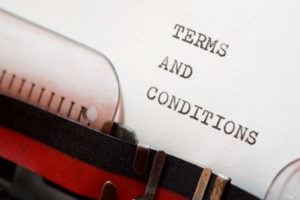 Bookmakers will regularly offer promotions that promise you something like your stake money back should the horse that you’ve placed a wager on come 2nd or 3rd instead of winning the race. The idea is to appeal to people that wouldn’t normally place such a bet, or to encourage people to bet a larger stake than usual given that there’s a chance that they’ll end up getting their money back even if their bet isn’t a winner. What some people don’t realise is that many bookies offer such bets a lot of the time without the promotion.
Bookmakers will regularly offer promotions that promise you something like your stake money back should the horse that you’ve placed a wager on come 2nd or 3rd instead of winning the race. The idea is to appeal to people that wouldn’t normally place such a bet, or to encourage people to bet a larger stake than usual given that there’s a chance that they’ll end up getting their money back even if their bet isn’t a winner. What some people don’t realise is that many bookies offer such bets a lot of the time without the promotion.
These wagers are known as cover bets and they work easily enough: you choose how many places you’d like to be able to get your money back on if your horse finishes in them, receiving slightly lower odds as a result. In other words, your horse might be rated as a 7/1 chance for a straight Win bet, but taking a cover bet that sees your stake returned to you if your horse finishes in the top three places could see those odds drop to 4/1 instead. You get your cover for the horse not winning and the bookie has less liability if it wins.
Cover Bets Explained
 There is a difference between a cover bet and a full cover bet, with the latter being something such as a Lucky 15. It covers all possible outcomes of the things that you’ve bet on, giving you 15 bets in the form of Singles, Doubles, Trebles and a fourfold acca. A cover bet, meanwhile, is using the word ‘cover’ in the sense of offering you a form of insurance. To put it another way, cover bets offer you some cover in case the horse or dog or whatever that you’ve bet on ends up only just missing out on a win.
There is a difference between a cover bet and a full cover bet, with the latter being something such as a Lucky 15. It covers all possible outcomes of the things that you’ve bet on, giving you 15 bets in the form of Singles, Doubles, Trebles and a fourfold acca. A cover bet, meanwhile, is using the word ‘cover’ in the sense of offering you a form of insurance. To put it another way, cover bets offer you some cover in case the horse or dog or whatever that you’ve bet on ends up only just missing out on a win.
You can usually find the cover bet option in the ‘More Markets’ section of a race on a bookmaker’s homepage. Once you’ve gone there, you’ll see that you can choose whether to be covered for your horse finishing in two places or three places. As an example, here’s a look at a race and the odds offered on ten horses, depending on whether you were placing a straight Win wager or a cover:
| Horse Name | Win Odds | 2 Places Cover Odds | 3 Places Cover Odds |
|---|---|---|---|
| Isis Jiel | 33/1 | 28/1 | 28/1 |
| Iliade D’urzy | 16/1 | 14/1 | 14/1 |
| I Love You Mess | 33/1 | 28/1 | 28/1 |
| Ilarita Mag | 40/1 | 33/1 | 33/1 |
| Inastie Danica | 7/1 | 13/2 | 6/1 |
| Ile D’airou | 33/1 | 28/1 | 28/1 |
| Indiana Beach | 10/1 | 9/1 | 9/1 |
| Ilha Grande | 7/2 | 3/1 | 5/2 |
| Idylle De Cahot | 10/1 | 9/1 | 9/1 |
| I Love My Wife | 20/1 | 18/1 | 18/1 |
As you can see, if a horse isn’t really thought to have much of a chance, the odds on it finishing within two or three places isn’t enough to change the odds dramatically from one to the other. In the case of Ilha Grande, meanwhile, the fact that it is the favourite means that there is a difference between two places and three places. Regardless, the point is that the odds are reduced in order to cover the bookmaker’s cost of offering to refund your stake if your horse finishes in the places but doesn’t win the race.
What The Rules Say
 Different bookmakers will have their own approach to the rules for cover bets. That being said, it is worth bearing in mind that they’ll rarely be so different as to mean that they’re unrecognisable from each other. With that in mind, it is worth having a quick look at what the vague rules of cover bets are. Simply put, the price for your selection is reduced but you get your stake money returned to you if you horse doesn’t win but finishes within the correct number of places, which are as follows:
Different bookmakers will have their own approach to the rules for cover bets. That being said, it is worth bearing in mind that they’ll rarely be so different as to mean that they’re unrecognisable from each other. With that in mind, it is worth having a quick look at what the vague rules of cover bets are. Simply put, the price for your selection is reduced but you get your stake money returned to you if you horse doesn’t win but finishes within the correct number of places, which are as follows:
- Cover Bet 2 Places – Money back if your selection finishes 2nd
- Cover Bet 3 Places – Money back if your selection finishes 2nd or 3rd
- Cover Bet 4 Places – Money back if your selection finishes 2nd, 3rd or 4th
Bets on non-runners in a race will be made void, with Rule 4 changes applying to the remaining runners, except on the cover bet price. The number of places covered will remain the same, unless the number of horses in the race drops too low. Dead-heat rules still apply, but the Best Odds Guarantee promotion will usually not be available on cover bets.
Why Take It?
 An obvious question might well be why you opt to take a bookie up on their cover bet odds instead of just opting for a straight Win wager or placing an Each-Way bet. The answer is that an Each-Way bet will cost you twice the price because of how the bet works. Opting for a cover bet instead will allow you to put the full amount of your available stake money into the bet, yet you’ll still get the ‘cover’ of your selection finishing in the places on account of the fact that you’ll get that stake money back. If it wins, meanwhile, you’ll end up being paid out as normal.
An obvious question might well be why you opt to take a bookie up on their cover bet odds instead of just opting for a straight Win wager or placing an Each-Way bet. The answer is that an Each-Way bet will cost you twice the price because of how the bet works. Opting for a cover bet instead will allow you to put the full amount of your available stake money into the bet, yet you’ll still get the ‘cover’ of your selection finishing in the places on account of the fact that you’ll get that stake money back. If it wins, meanwhile, you’ll end up being paid out as normal.
Another way of thinking about it is that you get the protection of your horse just missing out on a win without the need to pay for it up front. That is to say, an Each-Way bet would require you to pay double the stake and you’d only get half of that back in the event that your selection finishes in the places. This way you can save yourself having to pay double the stake and you get 100% of it back if your horse places. Here is a quick look at how that maths might work and why it might work out in your favour to opt for cover over Each-Way bets.
- £20 2 Places Cover Bet @ 28/1
- £10 Each-Way Bet @ 33/1, 1/5 for 3 Places
Your horse finishes second, meaning that you would get your £20 stake back from your chosen bookmaker if you opted for the cover bet. On the Each-Way bet, you lose the £10 part of the bet that was placed on the Win, meaning that the remaining £10 moves forward but is paid out at 1/5 of the odds that you initially received. This would work out as 6.6/1, so £10 x 6.6 = £66, plus your £10 stake back for a total of £76 returned.
Obviously £76 is better than £20, so you might think that it makes sense to take up the Each-Way bet rather than the cover. That would be true if your horse only finished in the places, but what about if it actually won? The cover bet offers lower odds, but you £20 stake means that you’d receive £560 in winnings plus your £20 stake back if your selection won. Compare this to the returns on on Each-Way wager, which would be as follows:
- £10 @ 33/1 = £330
- £10 @ 6.6/1 = £66
- £20 stake returned
That adds up to £416. The result being that you’d have won more money placing all £20 of your stake on the cover bet than opting for the Each-Way wager. Yes, you’d be paid out more if it finishes in the places, but is it worth losing £144 over? That’s something that you’ll have to decide for yourself.
It is important to note that while money back 2nd (3rd/4th, etc.) offers from bookies for certain races generally refund you in free bets cover bets like this will refund you in cash always.
Other Cover Bet Variations
The examples we are looking at here are for horse racing as this is the main sport where you find cover bets. Cover bets also exist in all sorts of other markets though. For example, you can sometimes bet on a football team to win but accept lower odds that mean if it ends up as a draw you get your stake back.
Another example could be you bet on certain Asian Handicap lines, in some of these bets you get your half your stake back depending on the final result, kind of like semi-cover.
